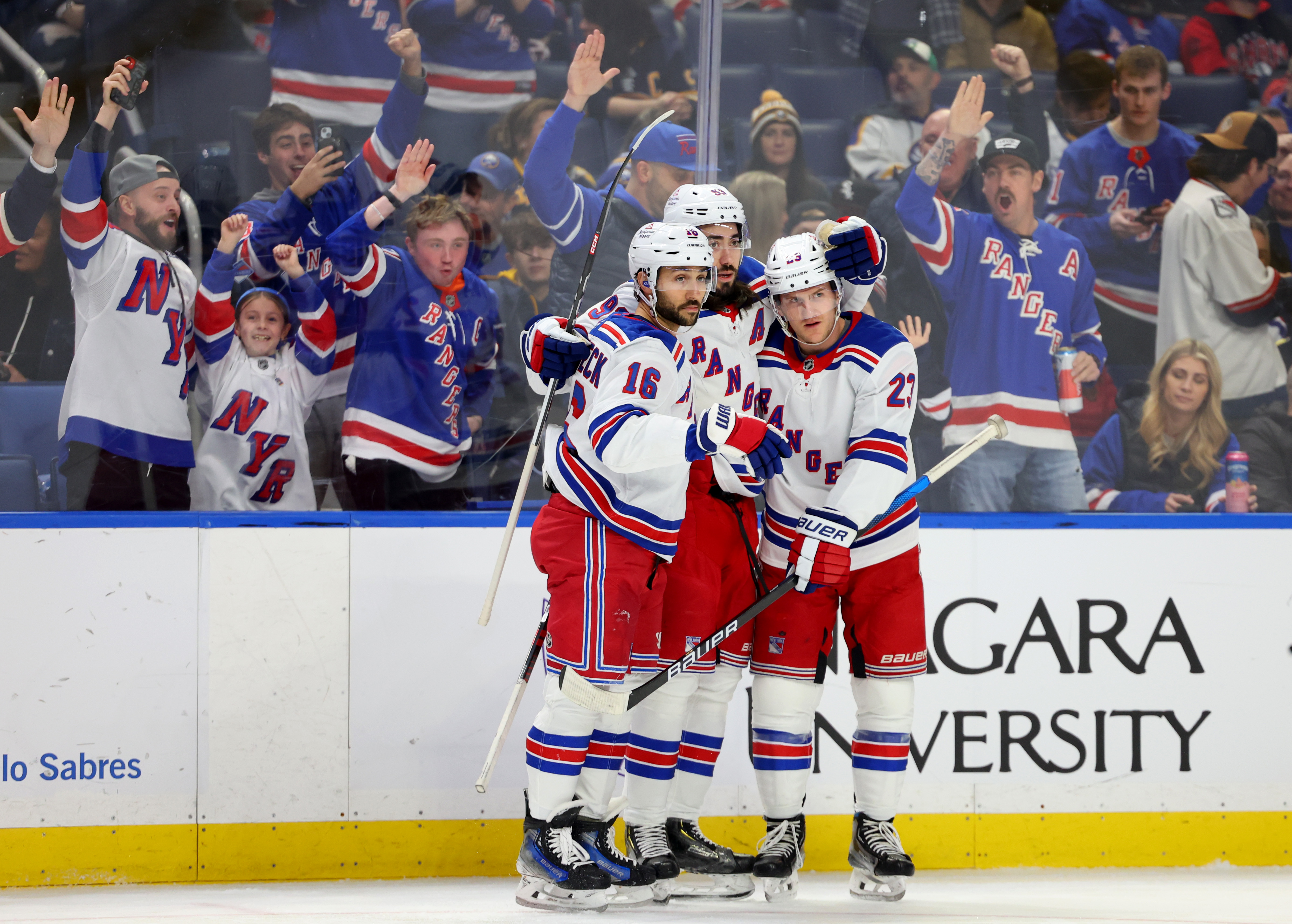Why this Rangers slide is on players, not coach Peter Laviolette
New York Rangers coach Peter Laviolette, hardly a John Tortorella type when it comes to dealing with the media, is nonetheless starting to show the strain when it comes to talking with reporters.
The answers have become increasingly terse and clipped. The recently-turned 60-year-old’s patience with repetitive questions, something he expected and handled with aplomb last season when his club rolled to the Presidents’ Trophy, appears to be waning.
Of course, it’s difficult to blame the veteran coach for exhibiting signs of stress. With his team in a stunning freefall that was at least temporarily interrupted by a 3-2 victory over the sinking Buffalo Sabres on Wednesday, Laviolette is in a bad spot: a Rangers coach who experienced significant success early in his tenure, only to have his roster seemingly tune him out quickly thereafter.
The Rangers look to be following the trend that claimed the job of Gerard Gallant, who was in charge just before Laviolette, and David Quinn, who preceded Gallant. Neither of those coaches lasted more than three seasons; Gallant was fired after two 100-point campaigns that included an Eastern Conference Final appearance in his first season.
Related: Why Rangers GM shouldn’t stop reshaping roster after Jacob Trouba trade
Rangers appear to have lost interest in yet another coach

In both cases, it was the players — many of whom remain on the roster as core pieces — who drove the dismissals.
Quinn, by the end, was seen as too “hands on” by the Rangers, who viewed him as a college coach overly involved in their business. That was despite his guiding of the rebuilding Blueshirts to an unexpected 37-28-5 mark in his second season and a berth in the NHL qualifying tournament that was held during the coronavirus pandemic. Quinn was fired after a 27-23-6 effort in the shortened 2020-21 season, one in which the players appeared to be blatantly ignoring the coach’s desire to play a more straight-ahead game and instead engaged in extended passing sequences in the offensive zone.
To be transparent, Quinn was always seen as a bridge to a more successful veteran coach once the rebuild appeared at its end. But the points are still valid.

Gallant, hired before the 2021-22 season, was viewed as a “players coach” who allowed professionals to police themselves in the dressing room and on the ice. That approach apparently wore thin in just two seasons, with the Rangers asking management in 2023 exit interviews for more structure and teaching following a first-round playoff loss to the New Jersey Devils — one in which the Rangers appeared to be outcoached when blowing a 2-0 series lead.
Theme alert: In his news conference following a loss in that series, Gallant expressed frustration over his inability to get the Rangers to play a north-south game instead of trying to make passing plays across the neutral zone that led to turnovers.
Laviolette, who led the Carolina Hurricanes to the Stanley Cup in 2006, installed a 1-3-1 defensive system and cranked up the intensity in practices in order to make his team better-prepared for the grind of the regular season and playoffs when hired before the 2023-24 season. At the same time, he worked to foster an atmosphere of togetherness and fun that included players’ families. The result was a 55-23-4 record in his first season that set franchise records for wins and points (114).
The extent of their dropoff in 2024-25, though, has dwarfed what happened under Quinn and Gallant. These Rangers, who played with tenacity, confidence and edge last season, have utterly abandoned the coaching for which they supposedly yearned. They barely defend, play with little to no emotion, neither hit nor battle for pucks hard enough and seem generally disinterested in being on the ice.
Laviolette’s mood has followed. Almost always supportive of his players and loathe to criticize them publicly, he questioned their effort and commitment after a 2-1 loss to the woeful Chicago Blackhawks on Monday. He was curt and snappy with reporters who kept asking about a momentum switch following the blowing of a 3-1 lead in a 7-5 defeat to the Seattle Kraken one day earlier.
Frustration was clearly bubbling below the surface when he addressed the media after a 5-1 loss to the Devils on Dec. 2, with similar ire being directed at reporters who asked questions that never seemed to faze him in 2023-24.
Laviolette’s angst undoubtedly stems in part from the same source that is generating major frustration from the fan base: confusion. The coach is understandably as perplexed as everyone else over what has gone so wrong for his talented team, one that many expected to take the next step and reach the Stanley Cup Final this season.
No one expected the Rangers to be fourth in the Metropolitan Division at this point of the season, nor to be going through a 3-8-0 stretch of extended poor play.
Related: Larry Brooks breaks down Mika Zibanejad’s issues on podcast: ‘I think he’s very sensitive’
Firing Peter Laviolette isn’t best Rangers solution

The Jacob Trouba Saga is finally over, but the messy situation lingered and took a much bigger toll on the Rangers than expected. General manager Chris Drury is likely going to make more changes to the roster, but new personnel might not change the shockingly dark mood around the Rangers.
Could Laviolette’s job be on the line? It’s absurd to think so after what happened with the past two coaches, and this group shouldn’t be taken seriously if it attempts yet another uprising. Mark Messier isn’t in their dressing room, Roger Neilson is not the coach and it’s not 1993.
Laviolette’s track record should, in theory, make him immune to even the possibility of being let go quickly by the Rangers. With a career mark of 821-538-155 with 25 ties, a Stanley Cup championship and the distinction of having taken three different teams to the Final, the coach is vastly more accomplished than any of his players in that department. The success of his first season on Broadway only burnishes those credentials.
Still … the collapse has been so thorough, it’s difficult to believe that Drury would rule out anything at this point. The Rangers have stopped responding to Laviolette more emphatically than they did Quinn or Gallant, once again conducting what amounts to an on-ice rebellion. What has happened to cause the precipitous descent from Stanley Cup contender to a dysfunctional, detached team that resembles their New York NFL brethren in one offseason?
CLICK HERE to shop at the Forever Blueshirts store
Drury is right to make almost anyone on his roster available. Much of the core has been consistent from Quinn through Laviolette, and an organization can’t continue to allow players to keep firing the coach — a practice that actually traces back to the end of Tortorella’s tenure.
There seems little question at this point that this is a difficult roster to coach. Talented but temperamental and alarmingly short on mental resilience and physical grit, the problem unquestionably runs deeper than who’s behind the bench.
Yet the old adage that it’s easier to change the coach than the players certainly applies here. Drury’s coup in moving out Trouba and his $8 million annual cap hit through 2025-26 aside, the highly paid veterans on the roster might prove next to impossible to trade. In the case of Mika Zibanejad, Artemi Panarin and Vincent Trocheck, there are also no-move clauses to deal with.
The idea that Laviolette could be on the hot seat would be ridiculous under regular circumstances; when it’s an organization that fired a coach immediately after he presided over 110- and 107-point seasons, it seems much more normal.
Drury, though, would be making a mistake to again take the path of least resistance here. Judging from his trade of Trouba and continued interest in remaking his roster, it appears the GM knows it.
More About:New York Rangers News

